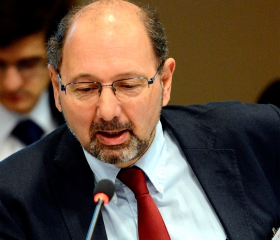On June 7 Poland hosted a NATO exercise, the largest in the country's history, with the participation of all bloc members plus Ukraine, while on June 6 the maritime phase of the Baltops-2016 game was launched in Finland. Were these provocations intended to trigger a response from Russia or were they business as usual? We asked Ilya Kramnik, head of Defense and Security Department at Lenta.ru online agency, to comment on the developments.
On June 7 Poland hosted a NATO exercise, the largest in the country's history, with the participation of all bloc members plus Ukraine, while on June 6 the maritime phase of the Baltops-2016 game was launched in Finland. Were these provocations intended to trigger a response from Russia or were they business as usual? We asked Ilya Kramnik, head of Defense and Security Department at Lenta.ru online agency, to comment on the developments.
Would you agree that NATO exercises are provocative and aimed to cause some sort of Russian reaction?
I wouldn't bet on their exact expectations but exercises like these, especially with Ukraine's role, are definitely provocative. Remarkably, the invitation of Ukraine seems to have come from Poland.
Why Poland?
Regrettably, the Polish defense and political elites of today have been traditionally unsympathetic to Russia. And the resultant tense relationship is a major factor shaping Warsaw's actions. Besides, Poland has been using anti-Russian rhetoric to assert itself in the North Atlantic alliance. Hardly a NATO major player but rather a burden, Poland is incessantly demanding help, mainly from the United States which eagerly provides it to a "frontline state." But to make things happen, the Polish leaders must tirelessly imitate struggle.
What must and can Russia do to feel secure with NATO gaming around?
As a matter of fact, extra efforts appear excessive. Russia has extensive armaments, deployment and reinforcement programs in a number of national territories. So, these are to be properly completed, and NATO exercises can hardly bring onto the scene something new that should cause revision of long-term planning.
Are these exercises to any extent specific?
They are, in view of their scale. The previous 30,000-strong NATO exercise was a long time ago. So, the scale seems adjusted to the dimensions of Russia. This is quite a massive endeavor on par with the Cold War days, although not the first one after the breakup of the USSR. Maneuvers with over one hundred aircraft in operation were held in 2016 in the Arctic.
Brussels keeps talking about Russia's aggressive ambitions. To what extent do you find them real?
These appear absolutely fictional. Russian doctrinal documents state exactly the same about the NATO threat. All Russian military moves are merely responses to the steps taken by the Alliance.
The Americans first shed the missile defense arrangements and launched their ABM projects in Romania and Poland, after which Russia built up its forces on the western flank, among other things deployed the Iskander missile system.
Then, upon lengthy and dead-end negotiations, Russia had to withdraw from the INF Treaty, as it lost credibility and could not meet our interests.
As far as deployments are concerned, one can easily see that Russia is trying to cover its bases for a possible aggravation in the Ukrainian territory. Some other deployments are in Russia's south, i.e. in the Caucasus and Central Asia.
What NATO is doing about Russia seems outright containment revisited. Do they really want a new Iron Curtain?
The Iron Curtain appears somewhat unviable because the two sides freely communicate, cooperate economically, and maintain personal, business and political contacts that are much more intensive than in the days of the Soviet Union. Of course, either Russia or the West may choose to build the wall but such steps appear impractical for both parties.
Prepared for publication by RIAC Website Editor Irina Sorokina and Editor-in-Chief Daria Khaspekova.





